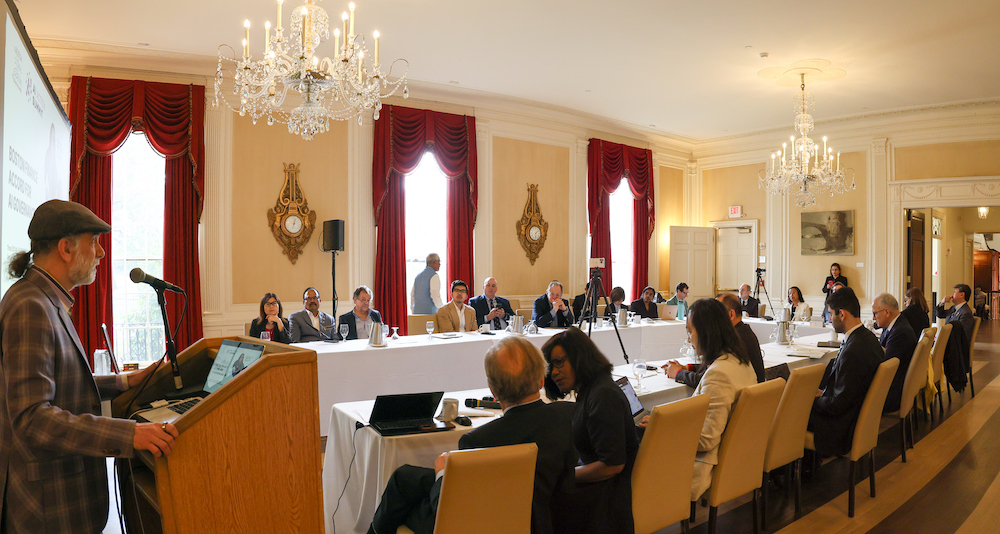
by Editor BGF | Apr 25, 2025 | Papers & Reports, Publications
Preamble
We, the signatories of the Boston Finance Accord for AI Governance 24/7, gathered on April 22, 2025, at Harvard University’s Loeb House, to affirm our commitment to a world where artificial intelligence (AI) enables governments and financial systems to serve citizens continuously, 24 hours a day, 7 days a week.
This Accord, launched under the Boston Global Forum (BGF)—founded in 2012 by Michael Dukakis, Nguyen Anh Tuan, Thomas Patterson, and John Quelch, with the guidance of its distinguished Board of Directors, including Governor Michael Dukakis (Chairman), Nguyen Anh Tuan (Co-Chair and CEO), Professor Thomas Patterson, Professor John Quelch, Professor Nazli Choucri, Professor Alex Pentland, and Professor David Silbersweig—builds on a legacy of ethical AI governance through the following initiatives: the AI World Society (AIWS) Initiative (2017), the Social Contract for the AI Age (2020), the Shinzo Abe Initiative (2022), and the Tokyo Accord for Government 24/7: AI and Finance Platforms (March 28, 2025).
The Boston Finance Accord leverages Boston’s financial and academic ecosystem to create a finance-centric framework for AIWS Government 24/7. It respects and extends the AIWS standards of ethical AI development, the Social Contract’s principles of mutual responsibility, and AIWS Government 24/7’s vision of continuous, citizen-centric service, enriched by the interdisciplinary expertise of the BGF Board. This Accord honors Shinzo Abe’s legacy of technology for peace and prosperity and celebrates Audrey Tang, recipient of the 2025 World Leader in AIWS Award, for her transparent governance innovations, as well as Élisabeth Moreno’s vision of finance as a “force for good” in her speech, Powering Progress 24/7.
Cybersecurity is a global challenge in today’s digital society and a common responsibility that all nations, organizations, and citizens must collaboratively address. Guided by ethical principles and the spirit of true Bushidō—the traditional code of the samurai, emphasizing integrity, moral responsibility, and the duty to protect others—this Accord promotes a cybersecurity framework encompassing all domains, from the private sector to the military, ensuring that continuous governance leveraging AI contributes to world peace.
Recognizing finance as the backbone of continuous governance, we integrate innovative financial systems with AI, guided by a new AIWS Knowledge System to ensure fairness,
kindness, and inclusivity, as depicted in AIWS Film Park’s stories (The Lantern’s Promise, The Bridge of Songs, The Starlit Pact, The Laughing Knight).
Adopted amidst global dialogues—such as the AI Action Summit in Paris (February 10-11, 2025)—this Accord advances the Age of Global Enlightenment, uniting finance, AI, and humanity for a peaceful, equitable future.
Read more The Boston Finance Accord for AI Governance 24/7 are here.

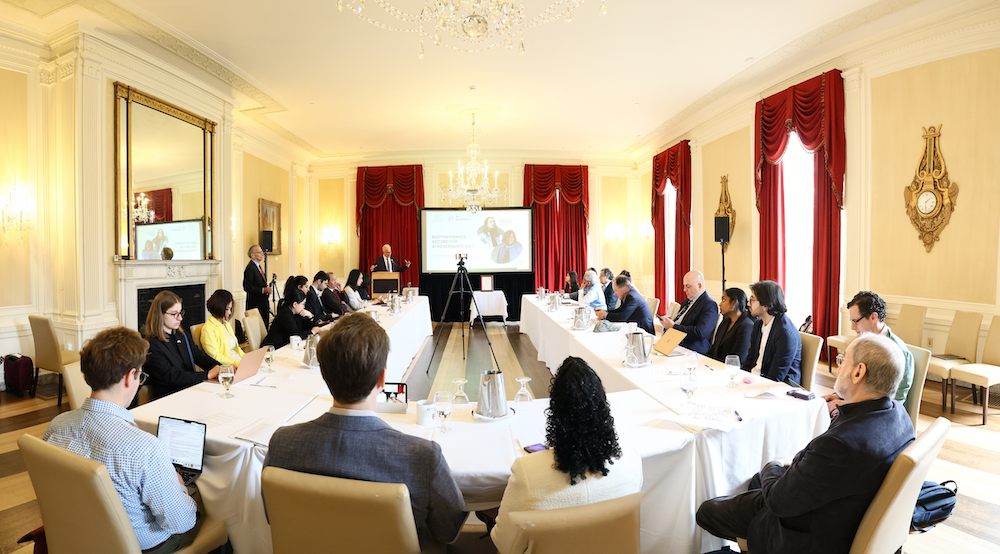
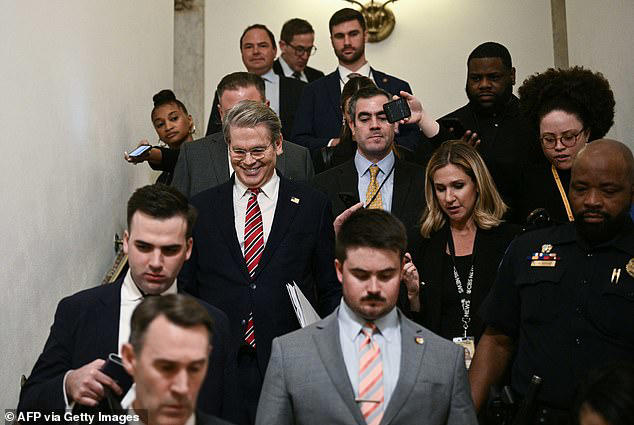
by Editor BGF | Apr 13, 2025 | News
Boston Global Forum Statement
Date: April 12, 2025
The recent tariff policy announced by President Donald Trump and members of his Cabinet marks an important decision in U.S. economic and strategic policy. It underscores the growing importance of alliances and economic partnerships between the United States and key democratic nations in the Indo-Pacific and transatlantic regions.
As highlighted by President Trump and the U.S. Secretary of the Treasury, the strengthening of economic ties with Japan, India, Vietnam, and South Korea reflects a broader vision of cooperative resilience among like-minded democracies. This presents a timely opportunity to form a new economic alliance that includes the United States, Japan, India, Vietnam, South Korea, the European Union, and the United Kingdom—nations that share common values, uphold the rule of law, and face shared challenges and threats.
The Boston Global Forum is prepared to convene high-level discussions to help shape a rules-based economic framework grounded in transparency, innovation, fairness, and mutual benefit. This vision aligns with the principles of the AI World Society (AIWS) and the Social Contract for the AI Age.
Such an alliance will strengthen trust among its members and provide a strong counterbalance to strategic threats. It will also lay the foundation for a new era of economic cooperation, technological advancement, and democratic stability in the Age of AI.



by Editor BGF | Apr 6, 2025 | News, Shaping Futures
The Boston Finance Accord for AI Governance 24/7, set to be unveiled on April 22, 2025, at Harvard University’s Loeb House during the Boston Global Forum (BGF) Conference, represents a groundbreaking framework to revolutionize governance through artificial intelligence and innovative financial systems. Building on the legacy of the AI World Society (AIWS) Initiative (2017), the Social Contract for the AI Age (2020), and the Tokyo Accord (March 28, 2025), this accord harnesses Boston’s financial and academic leadership—through distinguished professors from Harvard Business School (HBS) and MIT Sloan—to establish secure, scalable funding mechanisms for continuous, AI-driven public service. Championed by BGF co-founders Governor Michael Dukakis, Nguyen Anh Tuan, Professor Thomas Patterson, and Professor John Quelch, alongside its Board of Directors, the accord integrates ethical AI standards, citizen empowerment, and a new AIWS Knowledge System to promote fairness, kindness, and global collaboration. It aims to redefine governance for the Age of Global Enlightenment, ensuring 24/7 access to equitable, transparent services worldwide.
Invitation to Contribute
We invite thought leaders, innovators, policymakers, financial experts, and citizens worldwide to contribute to the official version of the Boston Finance Accord for AI Governance 24/7, to be announced at the BGF Conference on April 22, 2025, at Harvard University’s Loeb House. Your insights—whether on financial infrastructure, ethical AI governance, citizen participation, or the AIWS Knowledge System—will shape this transformative framework. Join us in advancing a vision where AI and finance unite to serve humanity continuously, reflecting the principles of transparency, equity, and inclusivity championed by the Boston Global Forum. Please submit your contributions, ideas, or feedback by April 18, 2025, to [email protected]. Together, let’s build a future of governance that inspires peace and opportunity for all.

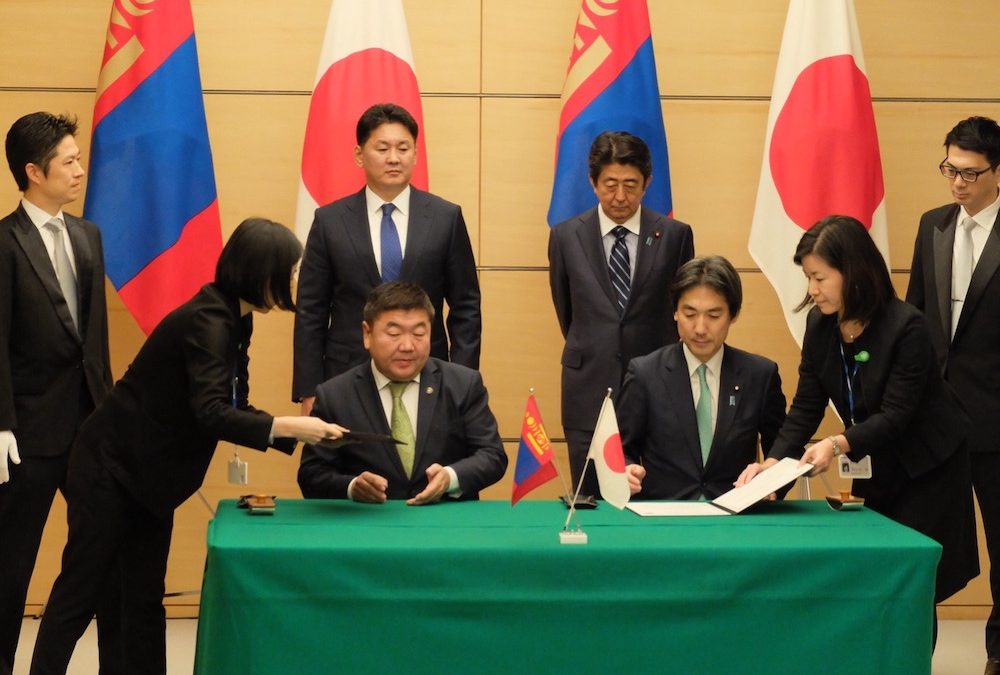
by Editor BGF | Mar 22, 2025 | Shinzo Abe Initiative for Peace and Security, News
The Boston Global Forum (BGF) is honored to introduce two distinguished leaders among those attending and speaking at the 4th Shinzo Abe Conference: Japanese Minister of State for Science and Technology Policy Minoru Kiuchi and BGF Co-Chair and CEO Nguyen Anh Tuan, highlighted by distinguished writers in this official publication of the 4th Shinzo Abe Conference.
Minister Minoru Kiuchi: Bridging Innovation and Governance at the 4th Shinzo Abe Conference – An Official Spotlight
Minoru Kiuchi serves as Japan’s Minister of State for Science and Technology Policy in the Ishiba Cabinet, a position he assumed on October 1, 2024, under Prime Minister Shigeru Ishiba. A veteran member of the Liberal Democratic Party (LDP) and the House of Representatives, Kiuchi represents Shizuoka Prefecture’s 7th District, having been elected seven times since 2003. With a distinguished career spanning diplomacy and politics, he brings a wealth of experience to his current portfolio, which also includes responsibilities for Economic Security, the “Cool Japan” Strategy, Intellectual Property Strategy, and Space Policy.
Please see full here
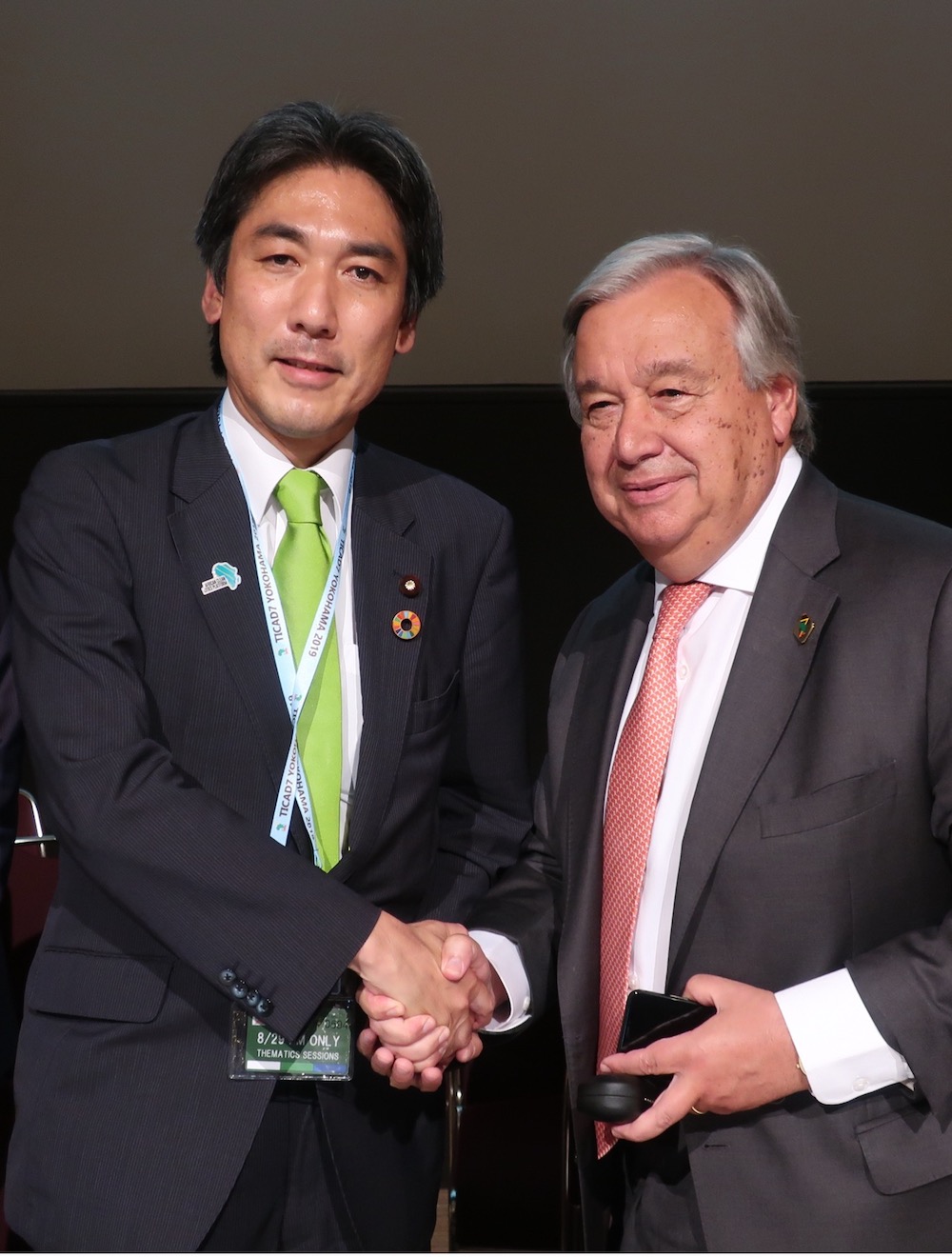
Nguyen Anh Tuan, Architect of AI Innovation and Global Enlightenment
Nguyen Anh Tuan is a visionary leader and innovator who has used his deep understanding of global technology, media, and governance to look forward to a world governed by a social contract of promise and possibility. He serves as the Co-Chair and CEO of the Boston Global Forum (BGF), co-founded in 2012 with former Massachusetts Governor Michael Dukakis.
BGF has emerged as a “think and do” tank dedicated to fostering peace, security, and innovation through international collaboration, particularly at the intersection of artificial intelligence (AI), cybersecurity, political exchange, and cultural exchange. It is a mission Tuan personifies; in other capacities he is a Distinguished Member of the Wilson Center’s Institute for Strategic Competition Steering Committee, co-founder of the Michael Dukakis Institute for Leadership and Innovation (MDI) and of the AI World Society (AIWS) Initiative, launched with Governor Dukakis in 2017, to advance ethical AI development. His AIWS Government 24/7 Initiative—envisioning AI-driven governance with governments serving citizens 24/7—earned him the title of Person of the Year 2018 from Vietnam National Television (VTV). In January 2025, Nguyen Anh Tuan was honored with the UNGSII Award at Davos, recognizing his outstanding leadership and contributions to advancing the Sustainable Development Goals (SDGs) through AI innovation.
Please see full here
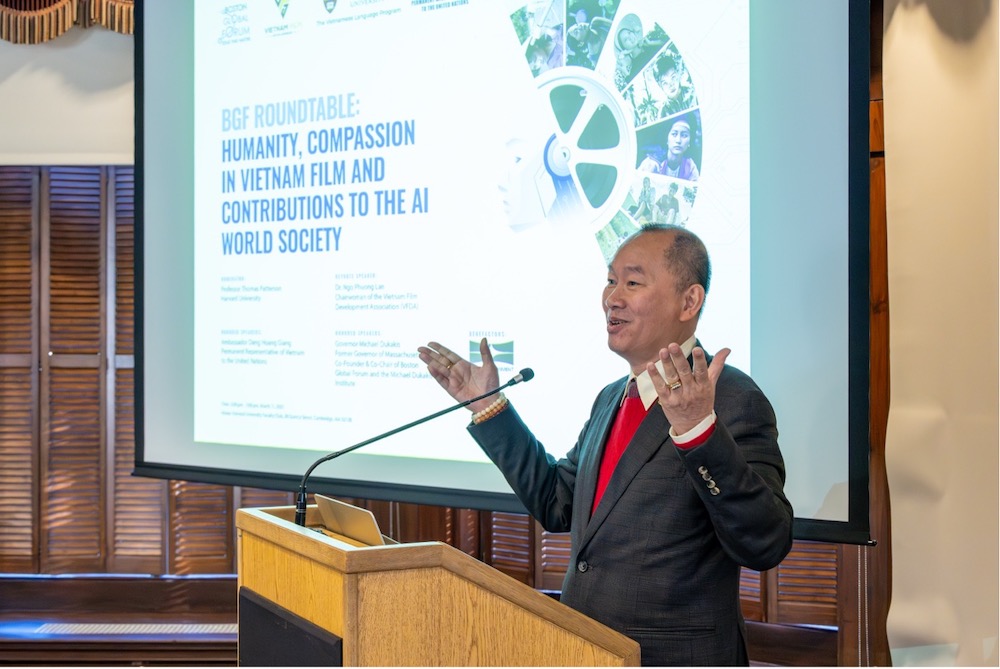
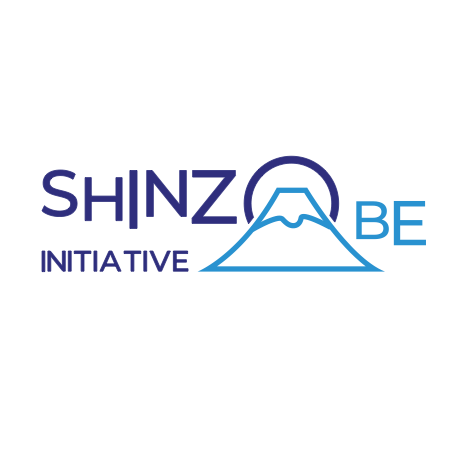

by Editor BGF | Mar 22, 2025 | News
Nguyen Anh Tuan is a visionary leader and innovator who has used his deep understanding of global technology, media, and governance to look forward to a world governed by a social contract of promise and possibility. He serves as the Co-Chair and CEO of the Boston Global Forum (BGF), co-founded in 2012 with former Massachusetts Governor Michael Dukakis.
BGF has emerged as a “think and do” tank dedicated to fostering peace, security, and innovation through international collaboration, particularly at the intersection of artificial intelligence (AI), cybersecurity, political exchange, and cultural exchange. It is a mission Tuan personifies; in other capacities he is a Distinguished Member of the Wilson Center’s Institute for Strategic Competition Steering Committee, co-founder of the Michael Dukakis Institute for Leadership and Innovation (MDI) and of the AI World Society (AIWS) Initiative, launched with Governor Dukakis in 2017, to advance ethical AI development. His AIWS Government 24/7 Initiative—envisioning AI-driven governance with governments serving citizens 24/7—earned him the title of Person of the Year 2018 from Vietnam National Television (VTV). In January 2025, Nguyen Anh Tuan was honored with the UNGSII Award at Davos, recognizing his outstanding leadership and contributions to advancing the Sustainable Development Goals (SDGs) through AI innovation.
Tuan has also co-authored influential works, including the Social Contract for the AI Age (2020) and Remaking the World – Toward an Age of Global Enlightenment (2021), shaping new political and social models for a better, safer, and more prosperous world through a humane pursuit and deployment of creative technological advance.
With deep ties to academia, Tuan served on the Harvard Business School Global Advisory Board (2008-2016) and chaired the International Advisory Committee of the UNESCO-UCLA Chair on Global Learning and Global Citizenship Education (2015-2017). As Fellow at Harvard Kennedy School in 2007, he researched trends in electronic media, further solidifying his expertise. His initiatives, such as Global Cybersecurity Day and the BGF-G7 Summit Initiative reflect his commitment to peace and security in the digital age.
This was the spirit which infused the launch of the Shinzo Abe Initiative for Peace and Security—founded on July 10, 2022— honoring the legacy of Japan’s late Prime Minister Shinzo Abe in fostering global peace and innovation. It also animates the selection each year of a World Leader for Peace and Security, whose recipients reflect the ideal of what Tuan has described as “global enlightenment”, ranging from statesmen to civil servants, spiritual leaders to political figures.
Hailing from Nha Trang in Vietnam, he envisions his hometown as a global innovation city, drawing inspiration from Boston. Tuan’s remarkable career began with groundbreaking contributions to Vietnam’s digital landscape. He founded VietNet, the country’s first TCP/IP-based Internet service provider, and later established VietNamNet, Vietnam’s leading online newspaper, where he served as Founder, CEO, and Editor-in-Chief from 1997 to 2011. Under his stewardship, VietNamNet became a platform for reform, introducing the innovative “VietNamNet Online Roundtable” to engage the public in live discussions with political, social, and cultural leaders. His pioneering efforts earned him recognition as one of Vietnam’s Top 10 Outstanding Young Talents by the government in 1996.
Tuan’s recent efforts include advocating for the AIWS Film Park, a hybrid cinema hub blending natural and AI-driven studios, and fostering Vietnam-U.S. film collaboration, as highlighted at the BGF Roundtable on March 11, 2025, at Harvard. Today, Nguyen Anh Tuan continues to bridge cultures, technologies, and ideas, driving a future where AI and humanity coexist for the greater good.
Tuan’s leadership has positioned BGF as a key player in addressing emerging global challenges. His humility and sense of inclusion have made all who know and have worked with him a part of his great adventure, an adventure which, in its truest sense, is eight billion people strong.
March 19, 2025
Writer: Ramu Damodaran, Founding Chief of the United Nations Academic Impact, former Editor-in-Chief of the United Nations Chronicle, and Permanent Observer of the University for Peace to the United Nations.

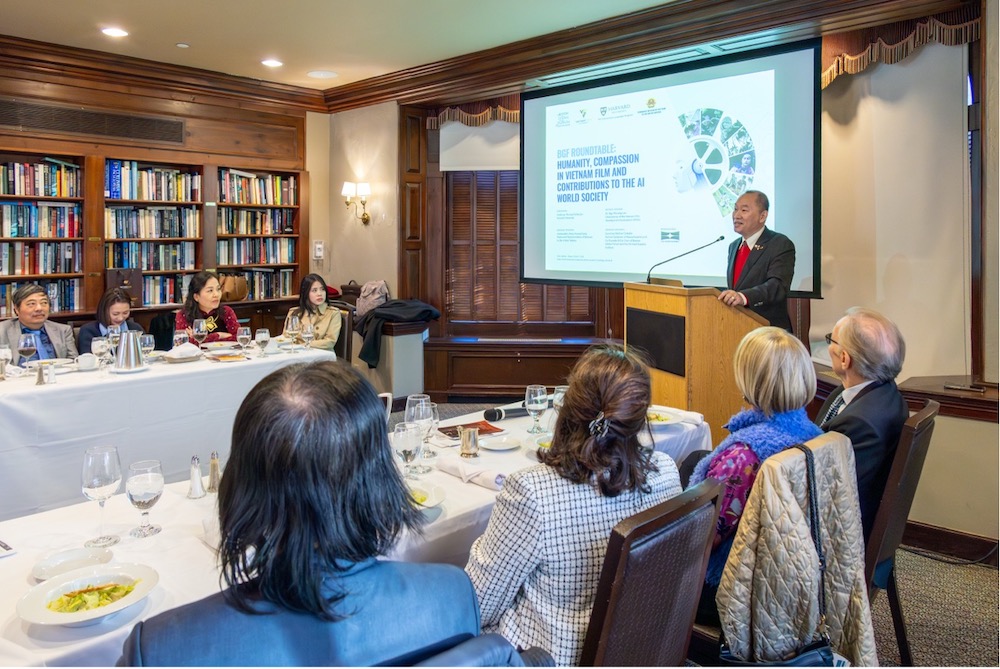

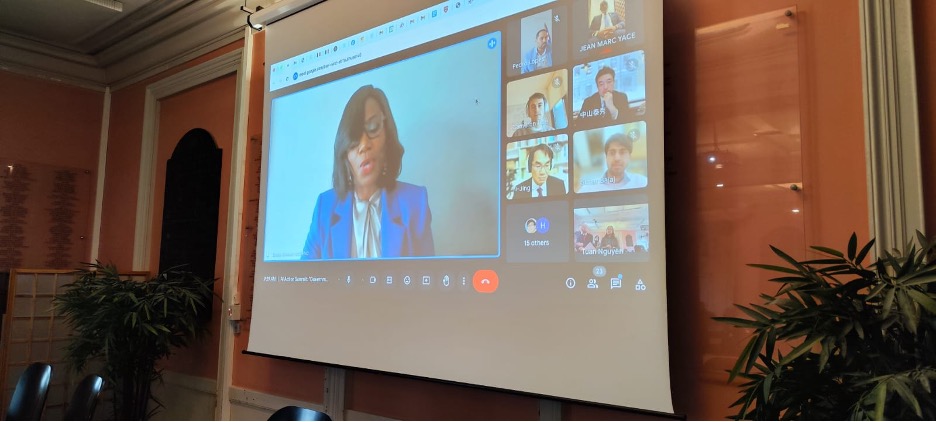
by Editor BGF | Feb 16, 2025 | Global Alliance for Digital Governance
Ladies and gentlemen, distinguished guests, and friends across five continents,
Today, we gather at a pivotal moment in history at the AI Action Summit Paris. A moment where the choices we make will not only define the future of artificial intelligence but will shape the very fabric of our societies, our economies, and our democracies.
AI is not just a tool. It is a force—one that can either deepen inequalities or bridge them, either automate exclusion or create opportunities, either strip away our humanity or amplify it. The path we choose is not inevitable. It is ours to define.
I am honored to be here today, as the representative of the Boston Global Forum (BGF) for France and the African continent, an institution dedicated to forging global leadership, peace, and security through dialogue and action.
I extend my deepest gratitude to Mr. Nguyen Anh Tuan, co-Founder and co-Chair of the Boston Global Forum whose vision has brought us together in this space of reflection and transformation and to the organizers of this AI Action Summit event at the Fondation de l’Ecole normale supérieure.
We also take this opportunity to present a document that pays tribute to President Emmanuel Macron and the people of France—a nation whose history is a testament to the power of ideas, innovation, and human progress.
This initiative, “Creating a New Paris of Enlightenment,” envisions France stepping forward as a global leader in the AI Age, driving innovation that is deeply rooted in human values, ethics, and progress for all.
Why invoke the Enlightenment? Because history has shown us that technological revolutions are meaningless without human progress. The Age of Enlightenment challenged dogma, democratized knowledge, and laid the foundations for modern society. Today, AI has the same potential—but only if we steer it with wisdom, courage, and inclusivity.
The Boston global forum is working for an AI that creates a fair, Inclusive, and Sustainable Future Because AI must serve humanity, not just power or profit. It’s a question of justice, trust, and shared prosperity. The future of AI must be built on principles that ensure technology empowers people, strengthens societies, and safeguards our planet.
To achieve this, we need strong governance, ethical innovation, and global collaboration.
We have worked on 9 fundamental principles to address these challenges:
- Governance & Accountability – A New Social Contract for AI and a Global Digital Governance Alliance to ensure fairness, transparency, and responsibility.
- AI for Smarter Societies – AIWS Government 24/7 for efficient, citizen-focused governance, and AIWS University to train ethical AI leaders.
- Equity & Inclusion – AI must empower all, not exclude. Gender inclusivity must be embedded at every level.
- AI for Well-Being – Transforming healthcare, education, and industry to improve lives.
- AI for Sustainability – A key tool to combat climate change, optimize energy, and drive sustainability.
- France Leading the AI Age – Not just a participant, but a global leader in ethical, human-centered AI.
This is not just a roadmap for France—it’s a global call to action. The future of AI is ours to shape. The time to act is now.
The real question before us today is not whether AI will shape our future. It is how we will shape AI.
Will it reinforce the divisions of the past, or will it forge new bridges of collaboration?
Will it be a weapon of control, or a catalyst for freedom and human dignity?
Will it replace humanity, or will it elevate what makes us human?
We have the minds, the vision, and the responsibility to answer these questions. So let us not just discuss the future. Let us design it. Together.
Thank you. I am now going to handover to Mr. Tuan Nguyen, CEO of the Boston Global Forum.
Thank you.
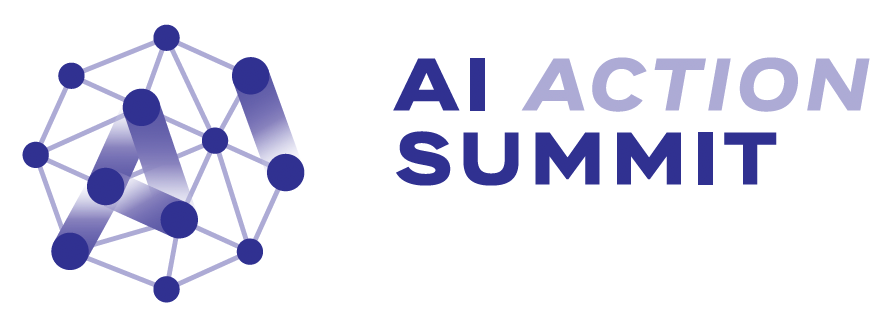


by Editor BGF | Nov 24, 2024 | Papers & Reports, Publications
Mark Kennedy’s speech at the BGF Conference “AIWS – New Democracy”
Harvard University Loeb House, November 25, 2024
During my first year in Congress in 2001, I faced a vote on whether to maintain Normal Trade Relations with the People’s Republic of China (PRC). I shared the belief of many at that time that democracy and capitalism were on the march and that digital technologies would empower citizens and consumers to help both spread across the planet. We believed then that the internet would empower citizens to hold their governments accountable. It was inconceivable that innovation could flourish in an environment of restricted access to information like in the PRC. We hoped that greater engagement with China would integrate them into the rules-based international order. With this view of the future, I voted to continue China’s trade status.
Oops.
The passage of time has revealed three realities. First, technology has undermined democracy and empowered authoritarian regimes. Second, the PRC is intent on undermining the rules based global order. Third, closed societies like the PRC can advance technology.
In 2017, the PRC issued an artificial intelligence (AI) development plan seeking to establish China as the world leader in AI by 2030. In August of 2021, China surprised the US by testing a new hypersonic missile that circled the globe and then maneuvered to its target with its guidance and maneuvering likely using AI. This threat to the US homeland was enabled in significant part by American technology. Even so, it demonstrated how the PRC’s unwavering focus and immense government resources can achieve ambitious technology goals.
Inflection Point
The US is at an inflection point. Depending on our response, we will either retain our edge in AI and other technologies that underwrites our economic leadership and our military superiority or surrender it to an ascendant China at great risk to our future prosperity and national security.
A congressionally mandated bipartisan commission led by Eric Schmidt, former CEO of Google, and former Deputy Secretary of Defense Robert Work concluded in 2021:
“America is not prepared to defend or compete in the AI era. This is the tough reality we must face. And it is this reality that demands comprehensive, whole-of-nation action…to defend against AI threats, responsibly employ AI for national security, and win the broader technology competition for the sake of our prosperity, security, and welfare… China’s plans, resources, and progress should concern all Americans. It is an AI peer in many areas and an AI leader in some applications. We take seriously China’s ambition to surpass the United States as the world’s AI leader within a decade.”
America’s actions to preserve our leadership in AI should match the scale of impact on our way of life if we lose our tech edge. Here are ten steps that America urgently must take to preserve its leadership in AI.
AI’s rate of adoption will be determined by people’s acceptance of the technology as much as by the pace the technology advances. In Edelman’s annual survey, global trust in AI companies fell to 53% from 61% five years ago. Trust in the US dropped more – by 15 percentage points and to a lower level, with only 35% trusting AI companies. AI must be implemented in a way that Americans trust and the world trusts more than that offered by competitors.
Earning trust begins with raising the level of society’s understanding of AI’s importance to US competitiveness and the risks of letting the PRC take the lead in AI. Education institutions must better prepare the workforce for the future. The safety net must efficiently address any job dislocations. Governments should leverage AI to deliver better public services, not to undermine civil rights. To the extent possible, companies and governments should put control into the hands of the users.
America should implement balanced regulations that encourage innovation while addressing risks like algorithmic bias and misinformation. Overly restrictive regulations risk allowing the PRC to gain the lead, giving autocracies an edge over democracies.
- Invest in America’s Capabilities
Sanctions to limit access to US technology has limits. Overcoming US sanctions on the company since 2017 and more recent advanced chip restrictions, Huawei’s new chip is allowing it to gain smartphone market share from Apple. The US must sprint to stay ahead.
Research. Concerned that the PRC is approaching the US in total research spending, the Chips and Science Act passed in 2022 authorized a significant increase in research support. Yet Congress is failing to appropriate the level of research funding authorized. Fully funding the authorized research spending is essential for the US to retain its innovative edge, including dramatically increasing funding to spur discovery in foundational and applied AI technologies.
Talent. The PRC graduates twice the number of Science, Technology, Engineering and Math (STEM) PhDs as the US. With the US ranking near the bottom in the percentage of graduates pursuing STEM fields, it has long relied on attracting the world’s best and brightest. Visas for Chinese students and academics have fallen by two-thirds since peaking in 2015. A recent surge in students from India is taking up some of the slack. It is important that policies and a welcoming environment continue to attract the global AI talent essential to US tech leadership while investing more in STEM education for American students.
Compute Advantage. More powerful semiconductors give America a critical AI advantage today. To keep ahead, America must gain a decisive lead in emerging technologies that promise faster and greener compute power like optical computing (using laser light waves), neuromorphic computing (modeled after systems in the human brain) and quantum computing (using subatomic particles).
Innovative Ecosystem. Creating an ecosystem where AI can thrive requires access to high-quality, diverse datasets that safeguard privacy and cybersecurity. Collaborations between tech companies, academia, and government accelerate AI breakthroughs. A vibrant venture capital market that fosters AI-focused startups is another American advantage it must maintain.
Not wanting to sell rope that may be used to hang it, the US implemented export controls for advanced semiconductors and chip-manufacturing equipment in October 2022. Bifurcating technology markets comes at a cost, but security must take priority.
Last August, the government implemented outbound investment restrictions on technologies with important security implications–semiconductors, AI, and quantum computing.
Access to restricted AI chips is still allowed through cloud-based services and advanced AI models. The US should apply restrictions in both categories, doing so in a way that preserves security while also ensuring global tech leadership.
The difficulty in implementing restrictions was evident in the mysterious appearance of TSMC tech in Huawei’s recent chips. Effective restrictions must evolve as technologies advance and workarounds are discovered. Since “More than nine-tenths of the time it takes an AI model to respond to a user query is spent shuttling data back and forth between logic and memory chips” restrictions on high-bandwidth memory (HBM) chips should be considered.
- Don’t Allow Things or People to be Manipulated
Things. The PRC’s Cybersecurity and National Intelligence laws compel companies to allow the government to secretly access data. The PRC’s recent tech crackdown reflects an even tighter control of private companies. These actions raise concerns about the ability of the PRC to spy or disrupt. This has motivated limitations on Huawei telecom equipment, port cranes, and software on vehicles. Further restrictions are being proposed for small drones and LiDAR sensors. The PRC is implementing its own restrictions.
The US needs to comprehensively survey the landscape and address all vulnerabilities where a competitor could access and control America’s things. The US needs to pay more attention to nations it might rely on to mobilize against PRC aggression. If PRC President Xi Jinping knows that Huawei’s heavy presence in the Philippines allows it access to detect US intent and complicate US action, it limits the deterrence impact of the expanded US military presence there.
People. The US is also rightly concerned about outside powers seeking to influence American public opinion whether it be through deep fakes or the algorithms of social media platforms. This is the logic behind the forced sale or ban of TikTok. The US needs to comprehensively address all platforms that present similar risks.
- Eliminate Dependencies in Tech Supply Chain
While continued trade ties between the US and the PRC helps deter aggression, Xi Jinping could be tempted to act if he perceived the US as so dependent for critical supplies on the PRC that America would be hamstrung if conflict arose.
This has led the US government to intensify its focus on supply chains and subsidize domestic semiconductor production. To achieve true resilience the US must do more to cultivate diversified supply sources for needed goods and services by working with other countries to develop authentically separate supply chains. This is particularly true for rare earth elements and ingredients essential for tech manufacturing.
- Market to Most Nations Possible
Restricting the PRC’s access of advanced chips will intensify its efforts to enhance its own semiconductor supply chain. Western chip equipment companies “are already seeing declines in revenue as they are forced to leave the Chinese market.” America risks losing it global market leadership that funds the research necessary to keep a tech lead if it does not proactively seek to include as many nations as possible in its tech ecosystem. The PRC is aggressively advancing its own AI exports with initiatives like the Digital Silk Road. The PRC will be happy to add as a customer any country the US excludes. Tech restrictions must seek to preserve security while permitting selling technology to the greatest number of nations possible.
The Gulf countries are an example of the choices America faces. They are offering huge subsidies and cheap energy to grow an AI industry. Saudi Arabia has committed to spend $100 billion on AI to keep up with its neighbor, the UAE. America has concerns sharing its most cutting-edge technologies given human rights concerns and their deep academic and business connections with the PRC. Yet America doesn’t want them to unambiguously join the PRC camp if denied access to US technology. The government’s balancing is reflected in Microsoft’s collaboration with the Saudi Data and AI Authority to advance innovation in the Kingdom’s Generative AI sector. These decisions must be carefully weighed and continuously monitored.
In the age of AI, those with the most data are advantaged. China’s data is generally not available to the US, while China can access many non-sensitive US data sets. America’s openness is its strength, but careful consideration must be given as to which datasets should be restricted.
Huawei has a 35% to 40% market share of equipment outside of North America. Is it finding opportunities to intercept data to be used for AI training without the owners’ knowledge? This is easiest to imagine where it offers its equipment as a managed service. There are similar concerns with the rapid expansion of Chinese cloud providers in Southeast Asia and Latin America. Chinese subsidies give it an edge. Data localization requirements and price sensitivity hamper US cloud providers. US must do more to promote trusted and secure data strategies.
The digital yuan, China’s central bank digital currency, is designed with the capacity to collect data on its users and transactions. This adds urgency to the contest over payment systems.
Global standards will either support AI systems that empower citizens or control them. The PRC has long sought to influence global standard setting bodies like the International Telecommunication Union. America must work closely with private industries and allies to ensure that international bodies set technical standards for AI that align with its values.
Alignment on Tech Restrictions. Actions on limiting access by revisionist powers to technology will only work if allies with similar technologies don’t circumvent such restrictions. That is why the US has worked closely with Japan and the Netherlands in crafting restrictions on advanced chips and chip-making equipment. It would be impossible to effectively restrict high-bandwidth memory (HBM) chips without the collaboration of South Korean producers Samsung and SK Hynix. Aligning actions among nations is hard, particularly with significant commercial interests at stake. Staying aligned with allies and partners will be both more important and more difficult as the AI race progresses.
Innovating Together. Innovation productivity is fueled by iterative collaboration among those who specialize in a specific field. It is vital that the US and its allies tighten research collaboration to maintain an aggregate lead in critical technologies. US scientists currently collaborate twice as much with Chinese partners as they do with those from Europe. Yet Europe has much to offer. For example, the EU is a strong competitor to China in all quantum technologies, including post-quantum cryptography, where the US lags China. The US would also benefit from more proactively pooling resources, talent, and innovation for AI advancements with European and Asian allies.
- Stay ahead on Defense AI Applications
AI is transforming warfare as shown by Ukraine’s success with AI driven drones. Both the PRC and the US are investing heavily in AI-driven military applications. The applications of AI are pervasive across the military – empowering autonomous vehicles on land, sea and air; digesting data from satellites, drones and other sensors to detect objects, spot anomalies and identify threats; responding to cybersecurity threats in real time; optimizing battlefield strategies; improving logistics; delivering virtual training and simulation; pinpointing targeting; engaging in offensive and defensive electronic warfare; facilitating human-machine teaming; permitting more flexible orbital warfare.
President Joe Biden recently released a National Security Memorandum on Artificial Intelligence. It “unequivocally states” the government should use AI only in ways that “align with democratic values,” and “specifically requires agencies to monitor the risk AI systems can pose when it comes to privacy, discrimination and human rights”. Providing clear guardrails can help accelerate adoption of AI in the defense and intelligence communities.
Yet arduous procurement systems, political forces resisting efforts to drop legacy systems and delays due to repeated continuing resolutions slows the US military’s implementation of AI-powered systems it needs to stay ahead. The PRC benefits from building its military capabilities anew. It is critical that the US finds ways to integrate new technologies quicker and better than the PRC.
Close
US actions to secure AI leadership are too ad hoc. Success requires a plan that comprehensively addresses the above action steps and authorizes a streamlined interagency effort. Governance should address real risks addressing AI bias, privacy and safety. But the US must also stay full speed ahead. While keeping a close eye on the risks of AI, it is important to ensure that governance efforts don’t disadvantage the US.
Another vote I took during the spring of 2001 was to stop debating the design of the World War II Memorial, now on our nation’s mall, and proceed with its construction. Only by taking the necessary steps to win the AI race can US strength deter aggression and avoid adding any more memorials to our national mall.
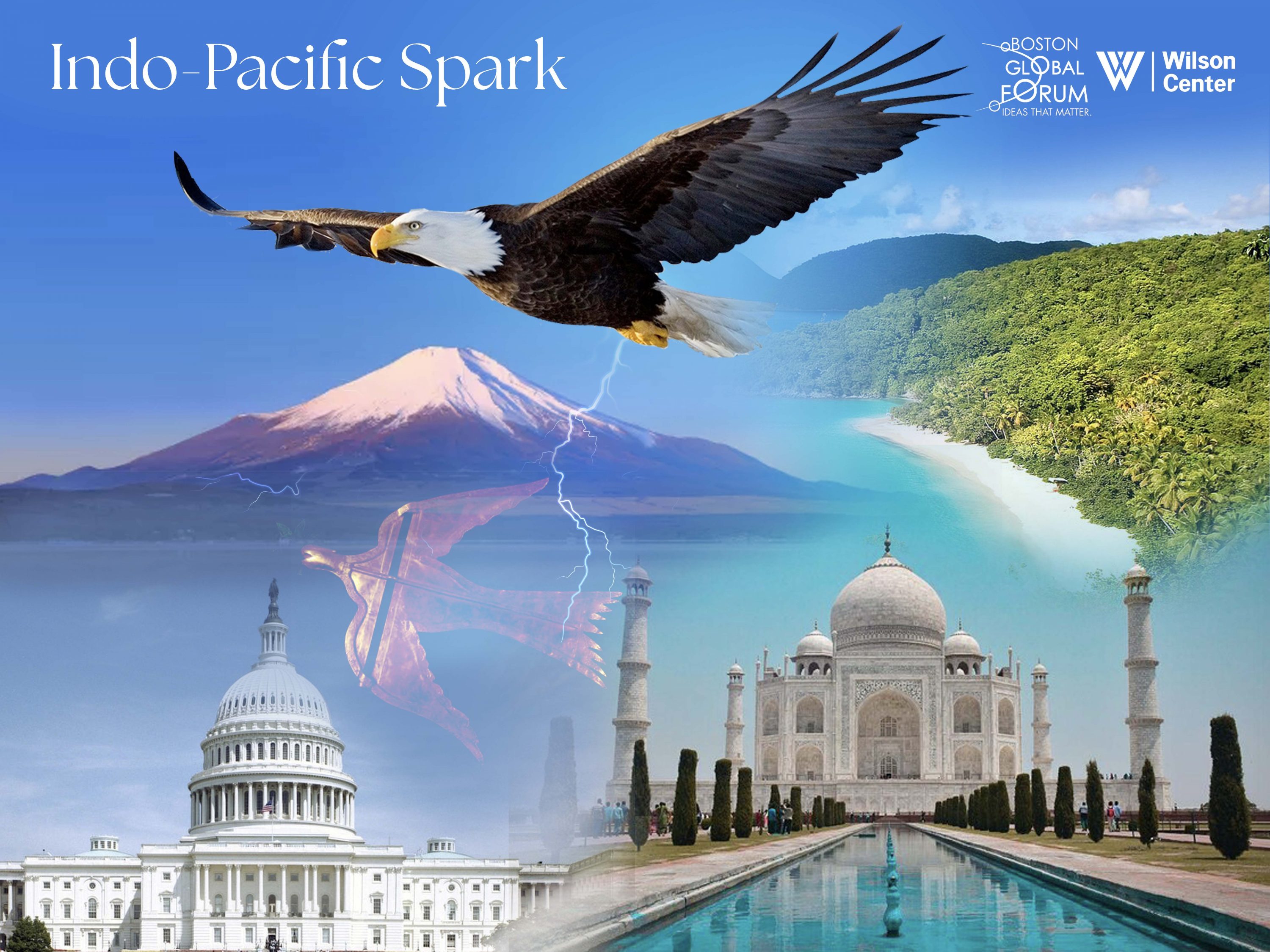
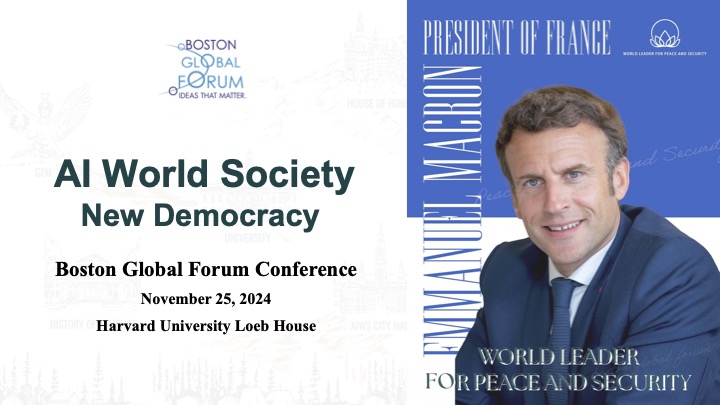
by Editor BGF | Nov 24, 2024 | Papers & Reports, Publications
Boston Global Forum, November 23, 2024
Abstract
The “AI World Society – New Democracy” is a comprehensive special report that envisions the transformative potential of artificial intelligence (AI) in reshaping democratic societies for the digital age. Building upon the AI World Society (AIWS) principles and the model based on the Social Contract for the AI Age, as well as the initiatives presented at the BGF-G7 Summit 2018 and AIWS-G7 Summit 2019, and elaborated in the book “Remaking the World – Toward an Age of Global Enlightenment”, this report outlines a framework for integrating AI ethically and effectively across key sectors, including governance, economy, education, healthcare, and culture. It emphasizes the importance of upholding democratic values, human rights, and ethical standards in the development and deployment of AI technologies.
A special practice to this vision is the designing and development of Boston Areti AI (BAI), a pioneering AI agent designed to assist government leaders in making informed, smart, optimal, ethical, and compassionate decisions. BAI embodies the AIWS principles by providing personalized support to leaders in their thinking, actions, decision-making, and personal well- being.
Furthermore, the report contributes strategies and solutions for New Democracies to effectively compete with authoritarian regimes in the global AI landscape, particularly in the AI-driven economy. By empowering democratic societies with ethical AI tools and frameworks, the report aims to strengthen their position in the international arena, promoting a model of AI development that prioritizes human rights, transparency, and societal well-being over control and coercion.
We invite scholars, policymakers, technologists, and citizens to contribute to this ongoing work. The complete report will be officially announced and discussed at the Boston Global Forum Conference on April 22, 2025, at Harvard University Loeb House. Your insights and participation are crucial in shaping a future where AI serves as a force for good in strengthening democracy and enhancing the quality of life for all.
AIWS Government: Reforming and Innovating Governance
The AIWS Government model represents a transformative approach to governance, leveraging AI technologies to address the challenges faced by traditional political systems. It aims to create government structures that are efficient, transparent, and responsive to the needs of citizens. By integrating AI into governmental operations, the AIWS Government seeks to enhance service delivery, improve policy-making processes, and foster greater citizen engagement.
Key Features of AIWS Government
- 24/7 Operations with AI Assistance
-
- Shift-Based Model: Implementing a three-shift system supported by AI allows government services to be accessible at all times, ensuring that citizens can receive assistance whenever they need it.
- AI Support: AI-powered chatbots and virtual assistants handle routine inquiries, providing instant support and information.
2. AI-Driven Policy Making
- Big Data Analytics: Utilizing vast datasets to make informed, evidence-based
- Real-Time Adaptation: AI tools enable policies to be adjusted in real-time based on current data and trends.
- Predictive Insights: Anticipating future challenges and opportunities through AI
3. Enhancing Transparency and Accountability
- AI and Blockchain Integration: Providing secure and transparent transactions, ensuring data integrity.
- Open Data Initiatives: Encouraging citizen participation by making government data accessible and understandable.
- Citizen Feedback Mechanisms: AI analyzes public input to improve services and policies.
4. Smart Governance Models
- Automation of Routine Tasks: AI handles administrative functions, allowing staff to focus on complex issues.
- Resource Optimization: Efficient allocation of resources based on AI
- Interdepartmental Coordination: AI facilitates communication and collaboration across government agencies.
5. Citizen Engagement and Participation
- AI-Powered Platforms: Facilitating public consultations, virtual town halls, and personalized communication.
- Personalized Services: Tailoring government services to individual citizen
- Inclusive Access: Ensuring services are accessible to all, including those with disabilities or in remote areas.
Benefits of AIWS Government
- Increased Efficiency: Streamlined processes and AI automation reduce delays and operational costs.
- Enhanced Accessibility: Services are available to all citizens, regardless of location or
- Improved Decision-Making: Data-driven insights lead to more effective and impactful
- Greater Transparency: Open data and clear communication build public
- Ethical Governance: Adherence to AIWS ethical standards ensures that AI is used responsibly and for the public good.
Boston Areti AI (BAI): A Pioneering Program for AIWS-New Democracy
Boston Areti AI (BAI) is an advanced artificial intelligence agent developed under the AIWS framework by the Boston Global Forum (BGF). Named after the Greek word “Areti,” meaning “virtue,” BAI embodies the principles of ethical AI, aiming to assist government leaders in their professional roles and personal lives.
How BAI Assists Government Leaders
- Enhancing Thinking and Strategic Planning
- Comprehensive Analysis: BAI processes extensive data to provide leaders with deep insights into current events, policy impacts, and global trends.
- Insight Generation: Identifies patterns and offers innovative perspectives to stimulate strategic thinking.
- Scenario Planning: Simulates potential outcomes of decisions, helping leaders anticipate future challenges and make optimal choices.
2. Supporting Actions and Implementation
- Actionable Recommendations: Translates decisions into practical implementation plans.
- Resource Optimization: Advises on effective allocation of resources to maximize impact.
- Monitoring and Feedback: Tracks progress and provides real-time updates for
3. Enhancing Decision-Making Processes
- Data-Driven Support: Offers evidence-based insights and predictive analytics to inform decisions.
- Cross-Sector Analysis: Integrates information from various sectors for a holistic
- Collaborative Tools: Facilitates consensus-building and stakeholder
4. Supporting Personal Lives and Well-being
- Work-Life Balance: Assists with time management and stress reduction
- Continuous Learning: Recommends educational resources and provides constructive feedback for personal development.
- Ethical and Emotional Support: Offers a confidential space for exploring ideas and navigating ethical dilemmas.
5. Personalization and Adaptability
- Tailored Interaction: Adapts to individual preferences and communication styles for effective collaboration.
- Adaptive Learning: Learns from interactions to provide more aligned assistance over time.
- Security and Privacy: Ensures confidentiality and compliance with data protection regulations, safeguarding sensitive information.
BAI’s Role in AIWS-New Democracy
BAI serves as a practical embodiment of the AIWS principles, demonstrating how AI can be integrated into governance to promote ethical decision-making, enhance efficiency, and improve citizen satisfaction. By directly supporting leaders, BAI contributes to:
· Ethical Leadership
- Encouraging decisions that uphold human rights, democratic values, and ethical
- Providing moral reasoning and ethical analysis to guide
· Effective Governance
- Enhancing the government’s ability to respond to citizen needs promptly and
- Streamlining policy implementation and service delivery through intelligent
· Personal Well-being of Leaders
- Supporting the mental and emotional health of leaders, enabling them to perform at their best.
- Offering tools for stress management, work-life balance, and personal
· Innovation in Public Services
- Introducing advanced technologies to improve service delivery and policy
- Fostering a culture of continuous improvement and innovation within
Conclusion
The “AI World Society – New Democracy” report outlines a visionary framework for integrating AI into democratic societies in a manner that is ethical, effective, and aligned with the core values of democracy and human rights. By adopting models like AIWS Government and leveraging technologies such as Boston Areti AI (BAI), democratic nations can enhance their governance structures, compete effectively in the global AI economy, and offer a compelling alternative to authoritarian approaches.
The report provides strategies and solutions for New Democracies to effectively compete with authoritarian regimes in the global AI landscape, particularly in the AI-driven economy. By empowering democratic societies with ethical AI tools and frameworks, we aim to strengthen their position in the international arena, promoting a model of AI development that prioritizes human rights, transparency, and societal well-being.
We encourage all interested parties to join us in this endeavor. Your contributions will help shape policies and practices that ensure AI serves as a tool for positive transformation, fostering societies that are more just, prosperous, and aligned with the principles of the AI World Society.
Save the Date: Please join us for the official announcement and discussion of the complete report at the Boston Global Forum Conference on April 22, 2025, at Harvard University Loeb House. Together, we can work towards a future where technology and humanity thrive in harmony.
For Contributions and Inquiries:
If you have insights, research, or ideas that you would like to contribute to the report, please reach out to the Boston Global Forum at [email protected]. Your participation is invaluable in shaping a future where AI strengthens democracy and enhances the quality of life for all.
References
- AI World Society (AIWS) Model
- Social Contract for the AI Age
- BGF-G7 Summit 2018 Initiative
- AIWS-G7 Summit 2019 Initiative
- “Remaking the World – Toward an Age of Global Enlightenment


by Editor BGF | Nov 10, 2024 | News, Shaping Futures
In recent years, many of us have enjoyed the convenience of AI assistants that retrieve information and perform basic tasks. However, a new generation of technology is emerging: AI agents, capable of much more than simple queries. These advanced AI models and algorithms can autonomously make decisions in real time, navigate complex scenarios, and seamlessly interact with various applications and platforms. Leading AI labs worldwide are racing to develop agents with enhanced reasoning, extended memory, and heightened interactivity.
The Boston Global Forum (BGF), through its AI World Society Initiative, pioneered the concept of AI Assistants in its Social Contract for the AI Age (2020). Building on this foundation, BGF has introduced Boston Areti AI (BAI)—an AI agent specifically designed to support and empower leaders. This innovation represents a significant step toward dynamic, decision-making AI dedicated to advancing human well-being, fostering compassion and innovation, and embedding core human values in its service to citizens worldwide.
https://www.ibm.com/think/topics/ai-agents
https://www.arthur.ai/blog/are-ai-agents-the-future-of-intelligent-systems#:~:text=What%20Are%20AI%20Agents?,game%20or%20in%20a%20robot.
https://www.theverge.com/2024/10/10/24266333/ai-agents-assistants-openai-google-deepmind-bots


















